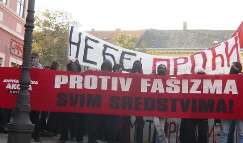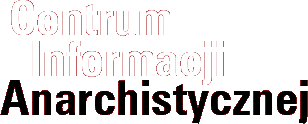Interview: Antifascism in Serbia
 BACKGROUND
BACKGROUND
On October 7th there was an antifascist demonstration in Serbias second largest City, Novi Sad. The reason was, that some fascist groups wanted to march through the city center remembering Heinrich Himmler. This march was forbidden because of protests of jewish organizations. The nazis announced that they would march anyway. The Antifa-demonstration clashed with some neonazis that encountered themselves behind a fence. After a while the cops arrested some 26 neonazis, so the situation became more calm. As I was told by some friends a bigger group of neonazis walked through the city center while the demonstration was occupied with this smaller group.
For more detailed information, three outer links:
http://www.infoshop.org/inews/article.php?story=20071008195912745
http://belgrade.org.yu/blog/520/guest-post-report-from-anti-fascist-rall...
http://www.revleft.com/index.php?showtopic=71654
Before the start of the antifa-demonstration, people met at the autonomous cultural center Crna Kuca 13 (CK13 / Black House) and I asked around for two people living inNovi Sad to give me an interview about antifascism in Serbia. So two people, i'll call them A and B accepted. A was quite stressed because of being one of the main-organizers of this antifa-demonstration. The courtyard was full with people putting on their scarfs to protect themselves against being recognised on nazi-photographies. Around their arms were tied armlets with red triangles on yellow background wich was the sign the nazis used to mark people with jewish religion coming from Novi Sad. Not everyone that wore the armlet knew what it ment. A, B and me sat down in a more quiet room and started the interview.
How established is fascist ideology in Serbian society today?
A: In Serbia? Well we actually have the problem that this a country in a transition period and so most of the people are trying to get out of their misery being left without their jobs and having no secure future and so on. So most of the young people that actually have no alternatives don't see how to solve those problems, so they try to find this easiest and fastest answer to their problems. That is the main thing, but also the very conservative government and the influence of the church are very important to establish, to normalize this kind of ideology. Because if it's normal to be a nationalist, it's also normal to be a right-wing-extremist.
Looking to this, what do you consider to be the social-economic situations or influences that bring more and more people to follow these ideologies? If I understand you right, this problem is growing bigger actually?
A: You know, in the western countries you have those immigrants-problems you don't have here. Here you've got problems with refugees. You have also the problem here that the structure of living is very conservative and anti-progressive. So all this can touch this issue of nationalism. You know there's also the Kosovo problem that can radicalize those nationalists too. So you see there is an open space for fascism here. Now we're trying to reduce their influence. So we're doing work on three different levels. The first one is educational, the second one is spreading our network and the third one is of course direct action as you see it today. But very rare we can do it like this, like that organized and also very rarely the fascists have the courage to expose themselves. So now the problem is that there is a lot of frustrated people among the intellectuals in Serbia who are very influentios and are giving support to those right-wing-extremists through ideology, through education and also through financing.
What do you think this depression of the intellectuals comes from? From recent history?
A: From recent history: over 25 years now intellectuals have been at first anti-communists and then mostly mediocritics, that don't understand the modern world. They dont want to understand, they want to create a hole here in which you can safely live and do nothing.
So is there influence of those right-wing-intellectuals on how anti-fascist work in general is seen in Serbian society? How is antifascist work seen in society and media?
A: Antifascists?
Yes, it is like the bad destructive chaots that are destroying everything?
A: Yes, they just say that ok, maybe there are extremists on the right wing but you have also the extremists on the left wing and they are the more dangerous. They're just in the media spreading the word that we are more dangerous and that society actually should stop us, not the right-wing-extremists. That is the role of the right-wing-intellectuals.
And your personal experiences with people that are not really involved in antifascist groups, what do they think about your work?
B: Well, they are usually against the fascist and racist ideology but activism is not well developed yet in Serbia enough to take action right after you realize that you are against something. So they are just against and sitting there and doing nothing. Just ignoring it. That is the average opinion in Serbia. Now I’m not talking about activists and extremists, fascists or antifascists.
A: Sorry, don't feel disappointed: if you have more questions, I just have two minutes left.
Ok, what do you think are the epicenters where fascism is concentrated in serbia? Like in the north, the south or just everywhere?
A: Their plan is to build the epicenters in the multicultural society, in the multicultural cities like Novi Sad. But in some parts where mostly serbs are living, they are not so influent. Sorry, I have to go.
So B and me just continue here... How do you consider the actual development of fascism in this part of Europe? Do you have the general impression that it is growing?
B: It actually started a few generations before, during Tito’s regime as well as during and after the war because the term of national identity was basically forbidden. We had no nations within Yugoslavia like Serbia or Croatia etc. We were all Yugoslavians. So, later the strong political lobby, the national identity started to grow. All of the sudden people realized: “You're a Croat, I'm a Serb and our neighbor Mustafa is a Muslim”. This is just an example, but people were totally unready to accept these now created differences and intolerance which was served mostly by the national television. So it was raising and raising during the war. With the new wave of corporative and cultural globalism they got more strength to rise up and to say: We are Serbs and don't want to belong to Europe. You know, in one hand they are like anti-globalists and on the other hand they are right-wing-extremists. So their ideas are attracting more and more young people who are led by the idea of keeping our national heritage and culture and protect it from the influence of the European union.
Actually, the speakers of those fascist groups, what are they referring to in their speeches? Mostly to this new national identity?
B: Yes, for example in Serbia like in every country in general, for example in France, it's not forbidden to be a nationalist, it's forbidden to be a fascist. So they're saying that they are for development of Serbia, for getting a national identity, which is really normal and it's sick not to have a national identity. So when they're speaking it sounds like a political speech , it's not against the law in any way, but you know, if you're reading between the lines than it's... i don't know... it's violent and it's asking for people to stand up against other nations. Again, fascist groups are forbidden by the country law to spread their fascist ideology in public...so as long as they are doing it in their front yard, it’s fine by the law…
But they don't referr to race or use antisemit arguments?
B: No. I mean, not in front of medias, not in public in general. But that is the main component of their leading ideology.
What do you think, an integration of serbia and other states from ex-yugoslavia into the european union would make the problem worse or better?
B: (laughs) I don't see joining the European union as a solution for fascism or any other social issue in Serbia, also like joining the NATO. It's the other issue in Serbia, because we were bombed by the NATO and now the government wants to join the “big military force”. So, again, the right-wing-extremists are abusing this situation to raise their hands and say that the Serbs are against joining the NATO and the European union because we were „victims“ of those military and political forces.
After yugoslavia splitting up you said that a lot of new national identities came up in those conflicts. Specially now in Serbia, do you see a relation between Milosevic and now the new right-wing-movement?
B: Well, Milosevic gave his contribution to this problem, but after he “left the country” we realized that we have more problems with the Radical Party of Serbia. While Milosevic was here, his political party was considered as the strongest opposition to the new democratic government. Everyone was so occupied with them that we didn’t even noticed that the Radical Party of Serbia is getting stronger and stronger.. Now they have the majority in Novi Sad for example. I would rather make relations between this party and the fascist movements. But I also wouldn’t exclude the influence of the Orthodox church.
Where are antifa-groups organized? Just in the bigger cities?
B: Yes, mostly in bigger cities but they have spots all over the place and when something happens they just gather on one place. But somehow I got the impression that they are more organized and stronger in multi-ethnic surroundings. I think that the reasons for that are obvious…
You know how strong is the outer coorporation of antifascist groups with those in other countries?
B: It started recently, I think. The antifascist groups weren’t so active before. We needed peace movements more, back in the nineties. But now it’s easier to get visas, so it’s logical that everyone started to cooperate more.
Are you personally concerned about the actual devellopment, do you feel like it's just a constant thing that the fascists try to recruit new assholeswhile there are enough assholes to stop being assholes or what do you feel like?
B: I have a feeling that it’s really black and white today... This is one of the biggest scandals in Novi Sad these days . So the medias were actually, this is my personal impression, lobbying against the fascist march. It wasn’t like that before, the eyes of people were more closed towards this issue. But I got the impression that now the public started to talk about it loudly. But it doesn’t mean that the fascist movement has less members. Even more! But again, there are more and more people against them...






